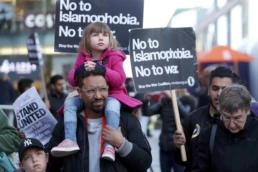It’s bold to claim there is no such thing as a black ‘contribution’ to Islam, and perhaps intentionally provocative, but for good reasons that I’ll point out later. Rest assured, this article certainly doesn’t mean to negate a shared Muslim story, but actually to confront the implicit way black Muslims are often regarded as fringe associates rather than inherent fellows.
To put it as a metaphor, rather than participating as co-chefs it is insinuated that black believers simply presented some ingredients. One way this is exhibited is by the superficial Bilalic recital that is a common feature in non-black Muslim justifications that Islam categorically rejects racism, as if the religion itself is the contention. Condescendingly, the prejudiced remind everyone that there is solid proof that black people have a place in Islam, and ‘he’ is Bilal b. Rabah, effectively a one-man show. But rarely do we hear about the Prophet’s wet nurse, Umm Aiman, with whom he’d affectionately joke, debate and spend time, or Mahja’ the first believer martyred at the battle of Badr, or Salim the most Quranically well-informed apostle in early Makkah who would lead the likes of Abu Bakr and Umar in prayer, or Usama b. Zaid a favourite of the Prophet (hubb rasulillah) and his military general, or Julaibib the martyr who killed seven pagans in the moments of his own demise with the Prophet declaring: ‘I am from him and he is from me’, or both Barirah (a close friend of A’ishah) and the comically lovesick Mugheeth repulsed by her. Bilal et al were not contributions from some nebulous black ‘group’ in Prophetic history but distinct and equal participants of the shared Muslim story; they made the story what it is.
The popular vernacular and mode of reference towards black believers of the past imagines them as a peripheral entity, and when they are spoken of, it is usually for rhetorical purposes that neglect a meaningful engagement with how they served to shape Muslim history, instead merely pointing out their existence. It’s not lost on the many who see it for what it is: parading the token black guy to fend off accusations of racial prejudice. Unfortunately, many Muslims tend to have a racialized view of faith, assuming their particular ethnic group to be vanguards of the ‘true’ Islam. Where the cultural products of some ethnicities are upheld or their cultural dominance in religious settings (even tacitly) maintained as the status quo, the diverse black experience is either disregarded or looked upon with disdain. ‘Blackness’ is often unwelcome, and those who posit a contention with racialisation or the projection of particular ethnic identities onto a shared religious space rarely contest the religious attitudes that stem from their own ethno-cultural communities.
A history of black Muslims
For some, what is black is instinctively African. Putting aside the complexities of a black British Muslim identity, even when it comes to Africa many Muslims do not deem the ‘African’ (usually beyond the North African context) to be particularly Islamic in the civilisational sense. Ironically, many of those who assume some sense of supremacy in their cultural religious understandings are not only oblivious that Africa had monotheism long before their part of the world, but that black scholars from the African Sub-Continent and Arabia have had a profound impact on general Islamic scholarship, not to mention fearless resistance against oppressors. In the history of the Abrahamic religious tradition, Joseph entered into Egypt, the Hebrews settled there developing their traditions until the age of Moses. After the destruction of Solomon’s temple in Jerusalem, it is reported that some of the Children of Israel fled south to Africa. Many exegetes citing Ali b. Abi Talib suggest that a prophet and his followers known in the Qur’an as As’hab al Ukhdud were Africans. After the Messiah, the main bulk of the Unitarians who rightly caused the earliest controversies of Christendom were Africans. And when the Prophet Muhammad’s own pagan Arab people turned on him, he didn’t turn to the Indians, Chinese, Persians, Romans, or the rest of Arabia, but a just, black, African king whom he knew would give sanctuary to the believers. East Africa was a second home to the early Makkan converts, a beacon of decency and peace when much of the world was drowning in tyrannical paganism.
The lazy assumption that those of the darker hue (the superficial marker that tends to lead to prejudice) haven’t made up a significant collective of believers or a distinct Islamic community (what I mean by civilisational) supports the inaccurate idea that such people can’t be intrinsic to the faith we practice today. But can there be an Islam or a Qur’an without Moses, the dark complexioned curly haired prophet, whose story has illuminated the righteous ever since he walked the earth? Sticking to the theme of Qur’anic content, what of Luqman whom some theologians also held to be a prophet, and with most affirming him to be a Nubian? God relates this noble character’s lengthy and enlightening advice to his son as a model that every father, for the rest of time, might emulate. (Q 31:12-19) In fact, can a mus’haf (scripture) be legitimately considered the Qur’an without parts that mention these people? And in order to emphasise my opening point to this article, were they ‘contributions’ to God’s message or are they actually part of the message itself? White-washing Islam to discount exemplars of the believing ummah or appropriate the faith for ethnic interests, especially where others are left out in the cold, is simply indefensible. Early Islamic exemplars such as Ata’ b. Abi Rabah, Mak’hul, Yazid b. Habib or Ibrahim b. Mahdi were black, and according to the Prophet’s sister-in-law Asma b. Abi Bakr, Muhammad b. al-Hanafiyyah b. Ali b. Abi Talib was ‘half black’.
[blockquote align=”none”]Famed Hanafi scholars such as the muhaddith Jamal-din al-Zayla’i author of the indispensable hadith work Nasb al-Raayah, and the jurist Fakhr al-Zayla’i commentator of the Hanafi work Kanz al-Daqa’iq, both hailed from what would today be Somalia.[/blockquote]
We look back longingly to the ‘enlightened’ Islam of Andalusia but few consider that the earliest significant foray into Europe that led to that venerated history was headed by Tariq b. Ziyad who landed on the somewhat eponymous Gibraltar rock, from Jabal Tariq (Tariq’s mountain). One of the most significant writers in Islamic history, al-Jahiz, was black and authored over 200 works on various subjects. Speaking to racist attitudes, he put together an impassioned defence on the qualities and accomplishments of black sub-Saharan and east African believers. Famed Hanafi scholars such as the muhaddith Jamal-din al-Zayla’i author of the indispensable hadith work Nasb al-Raayah, and the jurist Fakhr al-Zayla’i commentator of the Hanafi work Kanz al-Daqa’iq, both hailed from what would today be Somalia. Today, West African Mauritanian scholars known as the Shinqiti (pl. Shanaaqita, Latinised into Chinguetti) are renowned in the Arabic speaking world for their encyclopaedic knowledge, impressive memories, intellectual depth, and moderate stances. Even in the west, scholars and public-intellectuals such as Professor (Abdul Hakim) Sherman Jackson and Imam Zaid Shakir, as well as the influential and inspiring preacher Imam Siraj Wahhaj (to name a few) continue to offer intricate, reasoned, stirring and intelligent shar’i insights on a range of issues relevant to western Muslims. In the British Muslim context, it’s not been so much an erasure of black identity as it has been broad indifference. People will shoot down notions of race when ‘blackness’ pops up, all the while tacitly maintaining the dominance of their own cultural hegemony on a shared British Muslim existence. And this is why I chose a provocative title – hoping to overcome such disregard.
[blockquote align=”none” author=”John Stuart Mill”]We need not suppose that when power resides in an exclusive class, that class will knowingly and deliberately sacrifice the other classes to themselves: it suffices that, in the absence of its natural defenders, the interest of the excluded is always in danger of being overlooked; and, when looked at, is seen with very different eyes from those of the persons whom it directly concerns.[/blockquote]
Even where some hold black people to be equally believers by virtue of imaan (faith), there is still a great reticence in affording a fundamentally equal right to shape that shared identity. Often, the invisibility of black people in places of power is glaring, and not only is this true of politics but also the way we organise as the faithful. Some may struggle to understand where this complaint comes from since there seems to be no explicit appeal to dismiss anyone. But as J. Mills put it, the interest of the excluded is seen with very different eyes from those of the persons whom it directly concerns. As believers we should all be committed defenders regardless of our own skin tone or ethnic background. There are historical precedences found in the righteous scholars of old; the just caliph Umar b. Abdul Aziz was wholly cognisant of his responsibility to serve everyone, saying to his wife when questioned on his melancholy at night, ‘I thought about it and I found that I had been charged with the affairs of this ummah, its black and its red (people)…’
Ibn al-Jawzi in defence of black believers
Similarly, in facing down the pervasive negative racist sentiments in his time, the erudite Hanbali Baghdadi scholar Ibn al-Jawzi authored ‘Illuminating the darkness on the virtues of the Sudanese and the Abyssinians,’ which sought to address not only the value of their cultural heritage, but also denounce discrimination against black people that was rooted in their skin tone. Beginning with an account of black people as Hamitic and repudiating the biblical notion that Ham, son of Noah, was cursed by his father with dark coloured skin, he continued on to discuss the characteristics of the Sudanese black folk, describing them with strong bodies and hearts that ‘cultivate courage’ and the Abyssinians with ‘widespread generosity, upright morality, harmless towards others, smiles, good words, a lucid vernacular, and nice speech.’ In fact, this speaks to our current situation where it is inspiring to witness the perseverance of black believers who, despite the challenges, continue to engage and relate positively with the wider Muslim populace, not to mention the converts able to maintain their faith in the face of negative attitudes. Correspondingly, we mustn’t overlook the courageous who candidly challenge racist sentiments within their own ethno-cultural communities, especially in the face of intimidating reactions.
Ibn al-Jawzi proceeded to list favourable black or dark coloured things, on one occasion pointing to the heart as ‘the most noble thing in the body’ along with citing the hadith that talks of its influence over the entire human form, and on another occasion pointing to hair, stating that ‘If it is black it is the essence of good looks, and if it whitens good looks depart,’ rooting this in a supplication of the Prophet. He went on to cite Ali b. Abi Talib who remarked that the unwavering believers mentioned in the Qur’an as ‘As’hab al-ukhdud’ were Abyssinian believers; that one of the world’s greatest kings mentioned in surah al-kahf, Dhul-Qarnain, was black according to some, and so too was the Qur’anic sage Luqman. He even came to apostles and those from later generations, on the topic of those who were deeply attracted to black women apparently preferring them to others, citing this preference to challenge pervasive notions of beauty. Covering other interesting topics, he ended his work with relating prescribed litanies and supplications, seemingly to suggest that true believers should remember God and the higher objectives of the shari’ah in the face of discrimination and hostility. Of course, this isn’t to pacify the need to actively contest racism as his own work shows, but to stress the importance of such challenges combining with God consciousness and godly objectives.
Discriminatory rhetoric
Examples such as Ibn al-Jawzi’s highlight that it is far too easy to blame pervasive attitudes on a European post-colonial complex; he lived long before the villainous advent of western colonialism. These contemporary attributions of racism to colonialism deflect from dealing with a problem that would mean taking particular ethno-cultures to task without being able to project the cause of moral breakdown onto others.
There are clear examples of discriminatory rhetoric, one such being that in the immediate wake of the Woolwich killing of Drummer Lee Rigby, some Muslims were quick to point to the race of the killers, the ‘troubled’ black converts. Yet the same critics have never leapt to their feet to point out the Asian heritage of the Woolwich killers’ leader Anjum Choudary, nor the ethnic heritage of many others currently imprisoned for planning attacks against innocent people. Is this not exactly what they condemn the media for, especially when it comes to criminal sex gangs? And this doesn’t even touch the iceberg when it comes to the micro-aggressions many black Muslims face from co-religionists on a daily basis. As much as some Muslims rightly speak out about discriminatory policies and racist sentiments emanating from predominantly white right-wing public personalities and organisations, they seem to be distinctly inaudible on matters closer to home. It’s easy to holler denunciations in bubbles on social media with delusions of grandeur about speaking truth to power, or deplore those like the odious Boris Johnson who has referred to black children as ‘piccaninnies’ and black people with ‘watermelon smiles’ from a distance, but we can only take their commitment to challenging racism seriously when they equally take their own ethno-communities to task.
Long before the rise of western colonialism, racial prejudices against dark skinned people recurrently emerged in many non-European societies, and the righteous would be swift and decisive in addressing it. Aware of being engulfed by silly counter-claims of racism let me put it explicitly: obviously, racial prejudice isn’t a regional or Muslim phenomenon but a human one that, like many other immoralities, equally affects Muslims – it has occurred across time, amongst various cultures and faith-adherents, and in different parts of the world. Accordingly, my intent isn’t to point to any one particular ethno-cultural group in the UK, or make out that it is specifically a Muslim problem, even if Islamophobes inanely attempt to use this article for such ends, but to simply highlight that there is an ungodly problem and God expects that we need not only be conscious of it but put actionable measures in place to address it. Believers are called to ‘repel with that which is better, and those with whom you share antagonism will become as close as an old and valued friend.’ (Q 41:34) In a bid for some consistency it is important to note that pointing out social integration to be a two-way street is big talk if we cannot even integrate meaningfully with one another. Equally, multiculturalism serves as a nice buzzword, but any such call is pretentious if an equal commitment isn’t reflected in-house. And in forestalling any binary assumptions from this piece, just as black people make up a shared British Muslim identity, so too do others, irrespective of their skin tone or ethnic background.
Missing the point
Arguing that the controversial nature of the topic will lead to communal rupture is intellectual delinquency at its finest. Firstly, this point is only made by non-blacks, who as Mill put it, overlook the interests of the excluded and see it with very different eyes from those of the persons whom it directly concerns. Equally, those who put it that the current political climate means that Muslims should avoid such contentious issues overlook the idea that Muslims differ in what they believe to be a priority to the preservation of the faith or those things that significantly contribute to the everyday ill-being of believers. Secondly, it can’t logically be claimed that addressing the cause of disunity will instigate disunity, unless one is oblivious to the discord the cause is essentially triggering. Such lobbyists might be better served to actually engage black opinion on a wide level, and actually interact with conversations taking place amongst black Muslims. Thirdly, my intent is to bring us all together for a shared Islamic identity in the context of the UK and this article is rooted in the basic proposition that continued maltreatment or neglect will inevitably (and understandably) lead to the disintegration of a Muslim populace and internal antipathy. Rather than complain about a problem once it has transpired, some foresight dictates recognising early markers and calling ourselves, as a believing community – if that’s what we aspire to be, to remedy potential tribulations.
By removing obstacles of an unethical nature and working on a truly shared deeni identity, one that organically melds the best of what we all are, we should actually anticipate an enriching experience. And while it might require that we all slightly adapt to locate our commonality, rather than becoming nervous, we ought to look at it as part of the maturation process that develops the believing community in exciting and positive ways.




